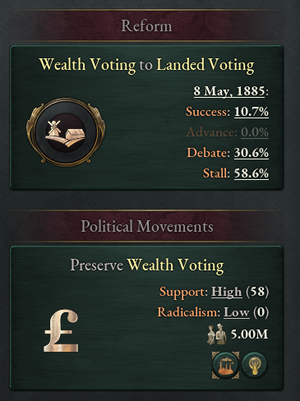政治运动是一种让人群直接向政府提出要求的方式,这要么是因为他们希望改变,要么是他们不希望你目前正在推动的改变。这允许政治上被剥夺权利的人群推动改革,即使他们缺乏政治力量或制度认可(institutional recognition)。
政治运动有一个特定的目标,只有在这个目标仍未实现的情况下才会存在。
政治运动类型
政治运动总是针对一条特定的法律,具有三种不同的形式:
- 维护 - 当有足够的力量反对通过某一特定法律时,就会产生这种政治运动。例如,如果
 大不列颠尝试废除君主制,实行共和制,这很可能会导致一场维护君主制的运动。
大不列颠尝试废除君主制,实行共和制,这很可能会导致一场维护君主制的运动。
- 制定 - 当人群普遍要求制定某一特定法律时,就会产生这种政治运动。例如,如果你有一个政治活跃,识字但同时非常贫穷的劳工群体,那么这些劳工可能会组织一场运动以通过最低工资法律。
- 恢复 - 这种政治运动的运作方式与制定运动完全相同,但其目的是使一项以前在该国生效的法律重新生效。恢复或制定某种法律的政治运动的区别在于前者可以获得一些额外的支持,因为相比尝试新理念,人们总是更喜欢回到过去的“黄金年代”。例如,在成功过渡为共和国的英国恢复君主制的运动。
支持度
政治运动在推动其目标方面对国家产生的影响表现为支持度。一场政治运动可以同时得到利益集团(代表政治建制中支持该运动的一部分)和人群(代表在街头支持运动的个人)的支持。
利益集团根据其势力为政治运动提供支持。哪些利益群体将支持或不支持一场政治运动,取决于他们是否会支持新法律(在制定/恢复情况下),或者是否会反对改变现有法律(在维护的情况下)。有高支持度或是政府一部分的利益集团不会支持政治运动,但如果政府利益集团对该行为不满意,他们可能会以其他的方式向玩家施压。
人群的选择更为复杂,他们可以支持一场政治运动,要么是因为该运动的目的符合他们的利益集团的需求,要么是因为他们可以直接从中获益——例如,受到歧视的人群会支持一场赋予他们更多权利的政治运动。人群提供的支持基于原始数据——支持人口占全国总人口的百分比。这意味着当在其利益集团之外采取行动时,支持一场运动的一个受到歧视的![]() 劳工所提供的支持与一个完全享有特权的
劳工所提供的支持与一个完全享有特权的![]() 贵族一样多。
贵族一样多。
换言之,虽然政治力量在政治运动中仍然发挥着重要的作用,以利益集团的形式使用其势力支持与他们喜欢的法律相关的运动,但也完全有可能在没有任何利益集团支持的情况下形成政治运动。例如,即使在政坛没有人愿意中维护工人的权利,街头愤怒的工人也可能足以影响法律变革。
政治运动的支持度对立法有两个直接影响:
- 影响成功通过法律的几率(在制定/恢复法律的情况下,更容易通过运动想要的法律,而在维护法律的情况下,会使法律更难被取代)。
- 制定/恢复法律的运动也允许一个国家尝试通过该运动想要的法律,即使该法律没有任何利益集团的支持。
激进派和效忠派
如果玩家不打算屈从于国内运动的意愿,那么政治运动的激进度将会发挥作用。并非每一场和平运动都会变得激进,运动很可能在没有实现目标的情况下失败,但忽视大部分人口和/或利益集团的意愿确实会带来一些相关风险。
激进度基于支持这场运动的激进派的数量以及愤怒的利益集团的势力。A movement with low radicalism is one that is intent on getting its wishes heard through peaceful means, while a movement with high radicalism is willing to use more extreme methods, up to and including sparking a revolution.
Radicals and loyalists, just like with interest group membership, are not whole pops but rather individuals within pops. ![]() Radicals are individuals who have become disillusioned with the government and political apparatus of the country and want to seek change through any means necessary, while
Radicals are individuals who have become disillusioned with the government and political apparatus of the country and want to seek change through any means necessary, while ![]() loyalists are "patriots" who are generally willing to put their political views and goals aside for the sake of the nation.
loyalists are "patriots" who are generally willing to put their political views and goals aside for the sake of the nation.
There is a large variety of ways that pops can become radicals or loyalists, here's a few of the more common reasons listed below:
 Pops that experience an increase in material living standards will become more loyal.
Pops that experience an increase in material living standards will become more loyal. Pops from political movements that have their demands fulfilled become more loyal.
Pops from political movements that have their demands fulfilled become more loyal. Pops that experience a decrease in material living standards will become more radical.
Pops that experience a decrease in material living standards will become more radical. Pops from political movements whose demands are ignored may radicalize over time.
Pops from political movements whose demands are ignored may radicalize over time. Pops whose standard of living is below the minimum they expect to have will radicalize over time, particularly if it's so low that they're actually starving.
Pops whose standard of living is below the minimum they expect to have will radicalize over time, particularly if it's so low that they're actually starving. Pops that are literate but discriminated against tend to radicalize over time.
Pops that are literate but discriminated against tend to radicalize over time.
Radicals and loyalists generally function in directly opposite ways. For example, radicals are more likely to create and join political movements (as well as playing an important role in radicalizing said movements) while loyalists will never join political movements. Loyalists make the interest groups they are part of happier, while radicals make them less happy and so on. This means that one way to prevent political activism and curtail movements that oppose your agenda is to increase the standard of living of your pops.
Pops will remain radical or loyalist until they either die or have a status change as a result of becoming more radical/loyal (for example, a loyalist pop might stop being loyalist if their material standard of living suddenly takes a nosedive), but they do, in fact, die. As generations die off and are replaced by new ones, less and less people will remember all the great things done for the country 30 years ago and will start wondering instead what has been done for them lately.
